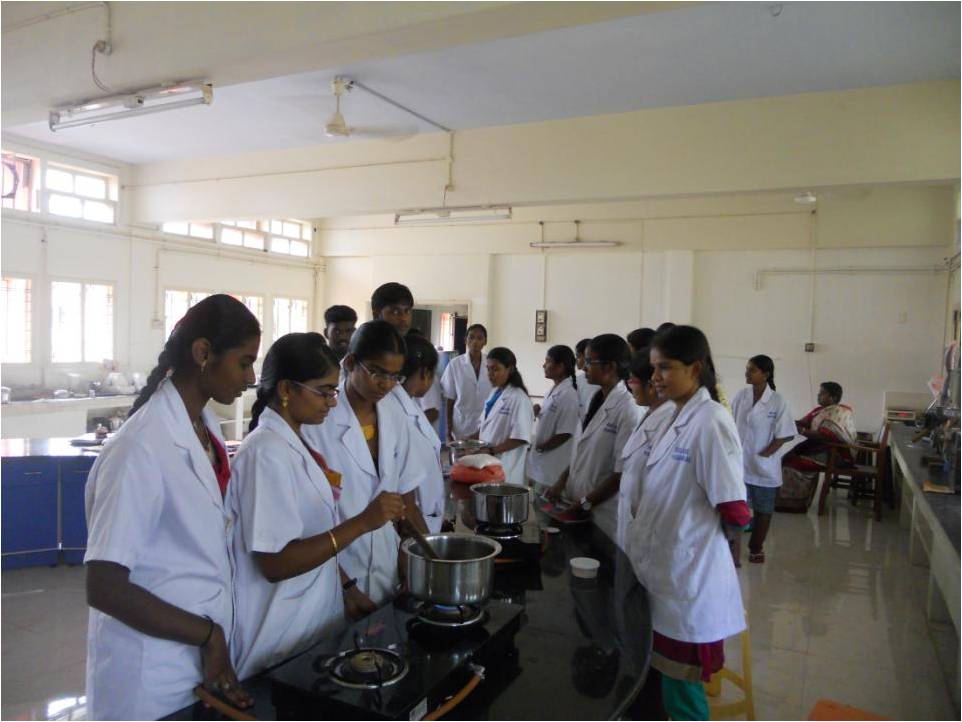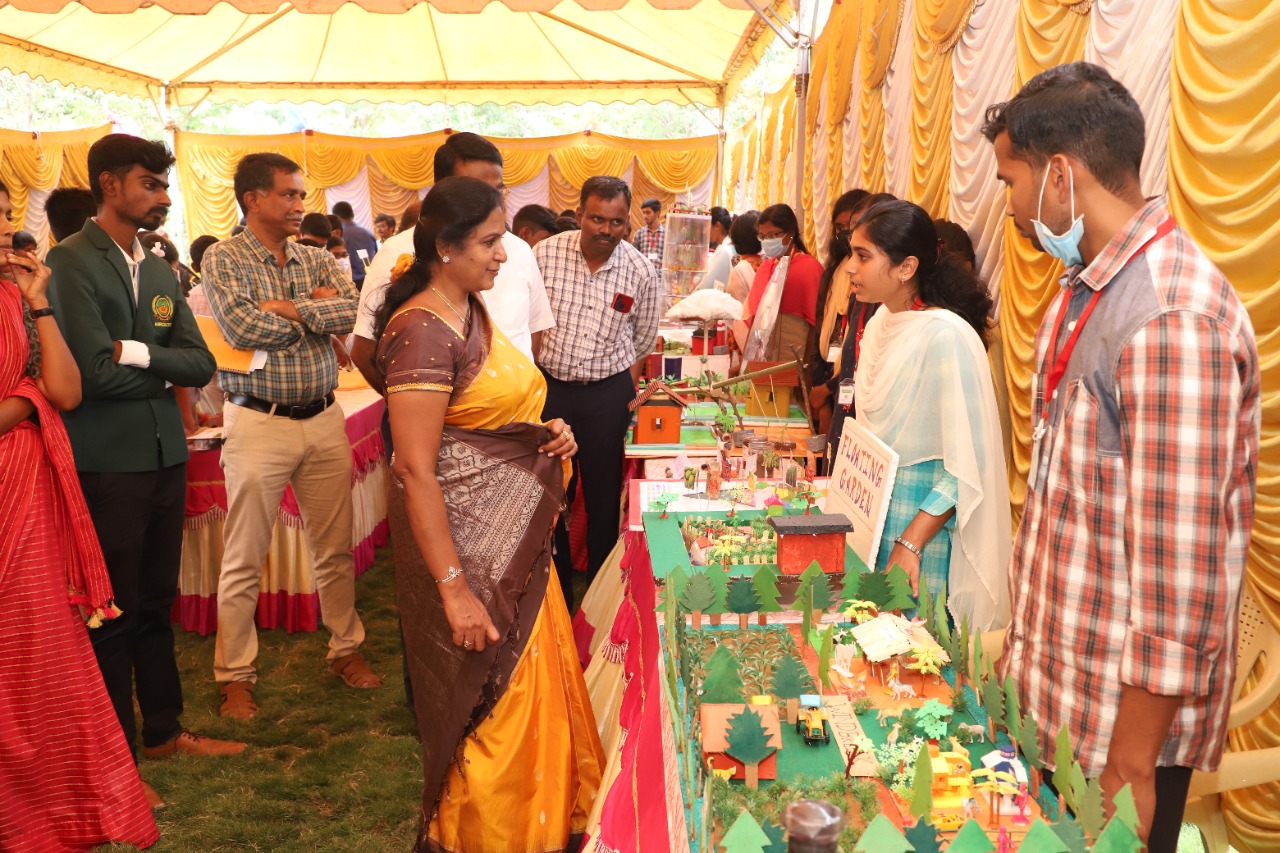The Tamil Nadu Agricultural University (TNAU) had its genesis from establishment of an Agricultural School at Saidapet, Madras, Tamil Nadu, as early as 1868 and it was later relocated at Coimbatore.
Get in touch
- info@tnau.ac.in
- 0422 6611200
- Monday to Friday: 9am to 5pm

Ph.D. (Community Science) in Food and Nutrition
Prelude
The Ph.D. Programme in Food and Nutrition involves course work which mainly concentrates on the recent advances in the relevant field and is research intensive, thereby giving the students the right leverage to work in renowned National and International Academic institutes, R&D divisions, Laboratories, Food Industry, other Government, Private-Public organizations etc., The effective management of food intake and nutrition are both key to maintain good health. Smart personalized nutrition, nutrigenomics, food nanotechnology, food biotechnology, mathematical modeling in food formulation, designer foods, therapeutic functional foods to prevent disease and disorders are some of the areas of concentration for student research. The research outcome generally culminates in innovative food products with wide scope for patenting, commercialization and information dissemination in public interest.
Why this programme?
- The Ph.D. programme in Food and Nutrition holds a lot of relevance, since food and nutrition security are the prime livelihood vulnerabilities in both developed and developing countries.
- The Doctoral students are trained in essential skills for food product development, designing foods based on consumer trends, community survey, identification of research gaps, formulation, implementation and evaluation of appropriate intervention strategies. Also, the program emphasis a strong focus on public health nutrition which is key to reducing malnutrition and which reflects the modern consensus on priority actions.
- The students are instilled a strong sense of commitment to science and the society and after successful completion of the programme they will be the rightful candidates for positions which require committed scientific temper at academia, industry, community level and the interest of the nation at large.
- The graduates can benefit immensely from the wide career opportunities in the food and nutrition domain which include the academia, R&D divisions of government and private sectors, food processing sector, medical nutrition, Food Testing Labs, and food biotechnology, health food sector etc.,
Study Programme
The continually growing field of food science and the ever evolving world of nutrition are exciting fields with plentiful career options after post graduation. It. moves towards disciplinary depth and mastery by well designed course of study, as per the ICAR-BSMA recommendation on par with all State Agricultural Universities of the country and similar area of study globally. The student research is well designed and chosen as per the suggestion of Renowned Subject Experts and other stakeholders by way of Brain Storming Workshop, generation of Research Think-Tank, ably guided by research advisory committee involving multidisciplinary expertise and developing a research proposal which has application for strategizing improvement in food, nutrition and health security indicators, for food industry, community development, entrepreneurial opportunities and for the benefit of the farming community and other stake holders.
More details on the list of courses and research work experience to be gained is listed here.
Ph.D. Courses offered
To replace table content
| Sl. No. | Course No. | Course Title | Credit Hours |
| 1. | FSN 601* | Macronutrient Metabolism | 3+0 |
| 2. | FSN 602* | Micronutrient Metabolism | 2+0 |
| 3. | FSN 603* | Nutrition and Agricultural Interface | 3+0 |
| 4. | FSN 604 | Global Nutritional Problems | 2+0 |
| 5. | FSN 605 | Nutrition in Calamities | 2+0 |
| 6. | FSN 606 | Maternal and Child Nutrition | 2+0 |
| 7. | FSN 607 | Hormones and Enzymes | 2+0 |
| 8. | FSN 608 | Energy Metabolism | 2+0 |
| 9. | FSN 609 | Application of Biotechnology in Food Science and Nutrition | 3+0 |
| 10. | FSN 610 | Recent Trends in Food Science and Technology | 3+0 |
| 11 | AGM 601 | Advances in Food Fermentation | 2+1 |
| 12. | FSN 691 | Doctoral Seminar | 0+2 |
| 13. | FSN 699 | Doctoral Research | 0+75 |
Application and Admission
For those students who are interested in taking part in the Ph.D. (Community Science) in Food and Nutrition degree programme, details on the specific Admission requirements and the application procedures are available at University website.
Future Career
Doctoral in Community science in food and nutrition
Doctoral Courses
After getting admission from Tamil Nadu Agricultural University, the students register for a set of courses that help them understand the Advances in Food Science, Food Technology Advances in Macro and Micro Nutrients and Nutrient Metabolism as per Choice Based Credit System (CBCS) with a total credit load of 100 credits, of which 75 credits are exclusively earmarked for their Thesis Research.
Doctoral thesis research
After completing the courses in the first year (I and II Semester), the students start their thesis research. Each student is assigned to an experienced faculty along with advisory committee member of related discipline, approved by the Dean of School of Post-Graduate Studies, who would guide the student on his/ her choice of research topic
Research internship
The students are exposed to several scientific events like symposia and conferences. Many are encouraged to have internship training at other institutes for a couple of months, either in India or abroad.
Online courses
As per the ICAR guidelines maximum of 20 % credits per semester may be allotted for online courses. The Master’s students may registered Online courses / Massive Online Open Courses (MOOC) related to Food and Nutrition offered by MHRD, GOI through SWAYAM – NPTEL project / ICAR institutes such as NIPHM, MANAGE, NAARM and other reputable National and International institutions.
Student Experiences

The curriculum has been meticulously designed to cover both nutrition and food processing. The theory and practical portions of the coursework are well balanced. The biochemistry, food biotechnology, and microbiology courses were inspiring and aided our ability to conduct interdisciplinary research. Excellent information on the occurrence of diseases caused by a lack of nutrition in society was provided under the nutrition courses. The food processing classes taught us hands-on practical skills and were a motivation for the students to start our own business in the future. The course syllabus and readings were most informative, and the course delivery rendered clear understanding and enjoyable. The course information was made simple to understand by the visual examples provided by the instructors. The power point presentation work that was provided to the class was most helpful in enhancing our communication and presenting skills. Questions from the students were encouraged by the teachers after every classroom sessions. During the course work, the instructor’s questions and responses were highly helpful.

At Community Science College and Research Institute, TNAU, amidst nature-oriented environment, good infrastructure accompanied by highly experienced and supportive faculties, I have witnessed our skill and competence rising to a zenith. The learner centric environment crafted not only trained us in academic curriculum but also motivated us in numerous ways. The stay at hostel campus was pleasant one and a life changing experience for me because it helped me in unleashing my full potential.

